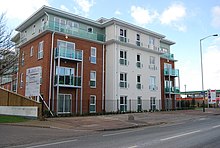
Back جمعية إسكان Arabic Asociación para la vivienda Spanish Housing association French 住宅協会 Japanese Woningcorporatie Dutch

In Ireland and the United Kingdom, housing associations are private, non-profit organisations that provide low-cost "social housing" for people in need of a home. Any budget surplus is used to maintain existing housing and to help finance new homes and it cannot be used for personal benefit of directors or shareholders.[1] Although independent, they are regulated by the state and commonly receive public funding. They are now the United Kingdom's major providers of new housing for rent, while many also run shared ownership schemes to help those who cannot afford to buy a home outright.[2]
Housing associations provide a wide range of housing, some managing large estates of housing for families, while the smallest may perhaps manage a single scheme of housing for older people. Much of the supported accommodation in the UK is also provided by housing associations, with specialist projects for people with mental health issues or learning disabilities, with substance misuse problems (alcohol or illegal drugs), the formerly homeless, young people, ex-offenders, asylum seekers, and people fleeing domestic violence.
In Australia, the term "housing association" refers to larger, growth-oriented 'not-for-dividend' community-housing providers. Smaller community housing providers may include trusts, cooperatives etc. State and territory-owned public housing represents about 80% of social housing in Australia. Over the years these public housing entities have had different names including: 'housing commissions', and 'housing trusts'.
- ^ Malpass, Peter (2000). Housing Associations and Housing Policy: A Historical Perspective. New York: Macmillan Press. ISBN 0-333-65558-3.
- ^ "Housing Associations in England – implications for Northern Ireland" (PDF). 2016.